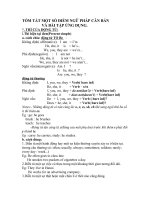Cac mau cau va bai tap ap dung.doc
Bạn đang xem bản rút gọn của tài liệu. Xem và tải ngay bản đầy đủ của tài liệu tại đây (54.47 KB, 3 trang )
A- Although, though, even though, in spite of, despite +
bài tập:
Although, though, even though + 1 mệnh đề.
1- Although, though = dù, mặc dù.
Ex: Although it rained a lot, we enjoyed our holiday.
I didnt get the job though I had all the necessary qualifications.
2- Even though = Thậm chí dù (ý mạnh hơn Although và though )
Ex: Even though I was really tired, I couldnt sleep.
3- In spite of, despite + a noun/ a pronoun/ V- ing = dù, mặc dù.
Ex: In spite of the rain, we enjoyed our holiday.
Despite what I said last night, I still love you.
Im not tired in spite of working hard all day.
Bài tập áp dụng:
1- Hoàn thành các câu sau bằng although hoặc in spite of
a- . all my carefull plans, a lot of things went wrong.
b- . I had planned everything carefully, a lot of things went wrong.
c- I love music I cant play a musicall instrument.
d- . being very tired, we carried on walking.
e- The heating was full on, but . this the house was still cold.
f- Hoa decided to give up his job I adviced him not to.
2- Đọc các câu sau rồi viết lại 1 câu mới có nghĩa tơng ứng. Sử dụng từ trong
ngoặc trong câu của bạn.
a- Although hes got an English name, He is in fact German. ( despite)
.
b- In spite of her injured foot, She managed to walk to the village. ( although)
.
c- I decided to accept the job although the salary was low. ( inspite)
d- We lost the match although we were the better team. ( despite)
.
e- In spite of not having eaten for 24 hours, I didnt feel hungry. ( even though )
.
B - Các dạng USE và bài tập áp dụng:
1- Use = Dùng, sử dụng.
Ex: I use my computer to type a letter.
She uses her glasses to read book.
2- Used to + V = thể hiện một hành đọng thờng xảy ra trong quá khứ hay một
thói quen trong quá khứ.
Ex: When he was young, he used to go to school late.
Hoa used to be fit. Now hes in terrible condition.
3- Be/ get used to + V-ing/ N = Làm quen với.
Ex: He is used to living alone.
She got used to driving on the left.
4- Be used for + V- ing = đợc dùng để làm gì.
Ex: Money is used for buying or selling goods.
Bài tập áp dụng:
Cho dạng đúng của các động từ trong ngoặc:
1- When I was a child, I used to swimming every day. (go)
2- It took me along time to get used to glasses. (wear)
3- There used to a cinema on this corner but it was knocked down.
(be)
4- Im the boss. Im not used to .told what to do. (be)
5- Youll have to get used to .less if you want to lose weight. (eat)
6- I used to . Ann but now she gets on my nerves. (like)
7- Ron got tired very quickly. He wasnt used to so fast.(run)
8- Tom used to a lot of coffee when he was a student.
C- Must, Have to, Have got to.
1- Must + V = Phải làm một việc gì đó (theo suy nghĩ của bản thân ngời nói)
Ex: I must get up early tomorrow. There are a lot of things I want to do.
2- Have to + V / Have got to + V ( nghĩa đời thờng) = Phải làm một việc gì đó ( do
hoàn cảnh khách quan)
Ex: I have to get up early tomorrow. I am going away and my train leaves at 7.
* Lu ý: Nếu dùng Must và Have to ở dạng phủ định chúng có nghĩa nh sau:
+ Must not ( Mustn t) do ST = Không đ ợc làm gì
Ex: You mustnt tell any one.
+ Don t have to do ST = không phải làm gì
Ex: You dont have to tell me.
D - should, had better.
1- Should + V = Nên làm việc gì đó
Ex: You should apologize him.
You should get up early
2- Had better + V = ( tốt hơn là ) Nên làm việc gì đó. (nó đợc dùng trong một trờng
hợp cụ thể nào đó, nếu không làm điều đó thì có thể xảy ra một hậu quả không hay)
Ex: You dont look well. Youd better not go to work today.
Your teeth are really hurt. Youd better go to the dentist.









